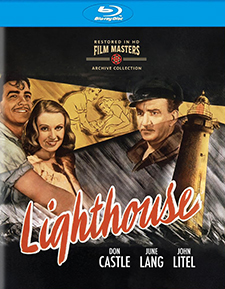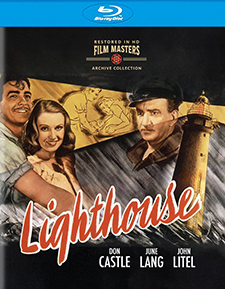Lighthouse (1947) (Blu-ray Review)

Director
Frank WisbarRelease Date(s)
1947 (April 1, 2025)Studio(s)
Sunset Productions/Producers Releasing Corporation (Film Masters)- Film/Program Grade: B+
- Video Grade: B
- Audio Grade: A
- Extras Grade: F
Review
Lighthouse, a B picture from Producers Releasing Corporation (PRC), is essentially a three-character drama that takes place primarily at a lighthouse station along the Pacific coast. At a mere 60 minutes, it tells a story of love, jealousy, and an unusual form of vengeance.
Sam (Don Castle) is an assistant lighthouse keeper on a small island off the California coast. His boss is an older man, Hank (John Litel). Sam is a shirker who makes excuses to head for shore almost every weekend, leaving Hank alone to tend the lighthouse. This time, Sam feigns a bad toothache and the good-natured, trusting Hank once again gives up his own weekend ashore. Sam, of course, doesn’t visit a dentist. His plan is to meet his girl, Connie (June Lang), and go out drinking.
Connie is becoming impatient with Sam’s frequent absences and unwillingness to set a date for their marriage. Unbeknownst to Connie, Sam has been chasing other women. Determined to confront him once and for all, she takes a motorboat to the lighthouse only to find that Sam isn’t there. Instead, she meets Hank and finds out the truth about Sam—he’s married. Crushed by the information and then incensed, she plans her revenge. She will marry Hank.
This development occurs quickly, with few transitional scenes. Hank is lonely and easily falls for Connie’s charms. Things become awkward when the newlyweds return to the lighthouse, give Sam their happy news, and all three now live at the lighthouse.
When we first meet Sam, he seems to be the romantic leading man. A resemblance to Clark Gable adds to his appeal. We find out he’s a deceptive, adulterous womanizer. Connie at first is less than sympathetic—a fish cannery worker with “a past” looking for a husband to take her away from it all. We develop sympathy for her gradually as we learn about her rough life and how heartlessly she has been duped. As the plot progresses, our feelings for her get pulled in opposite directions until the denouement.
Director Frank Wisbar has crafted an interesting, fast-paced spin on the romantic triangle melodrama, with a straightforward narrative that never gets bogged down with subplots. The editing moves like lightning with brief fades to black bridging scenes. The acting in this low-budget picture is surprisingly good, and Litel is particularly affecting as the soft-spoken, gentle Hank. Aside from a few incidental barflies, the only other character is Connie’s friend and roommate, Jo Jo (Marion Martin), a street-smart floozy with a memorable hairdo who appears in a few brief but significant scenes.
Director Wisbar opens up the film with several picturesque scenes on the lighthouse island and a few shots of the dingy streets of the port town on the mainland. The interior sets are cheap and look it. Even when Connie spiffs up the place, she can’t make it look much better. So production value isn’t the major selling point of Lighthouse. It’s the story and performances.
Lighthouse was shot by director of photography Walter Strenge on 35 mm black & white film with spherical lenses, finished photochemically, and presented in the aspect ratio of 1.37:1. The picture quality is good, though it doesn’t come up to the standard of Blu-ray releases from major studios. PRC was regarded as a “poverty row” studio, whose bread and butter was inexpensive black & white films without major stars. The lighthouse location is nicely exploited but the interior sets are bare bones, with a minimum of set dressing to make them look lived in.
Audio is included in English 2.0 mono DTS-HD Master Audio with optional English subtitles. Dialogue is clear and easy to understand. Ernest Gold’s score creates appropriate atmosphere and adds some class to the skimpy production. Though the sea is visible in outdoor scenes, we never hear it clearly. Since the ocean highlights the location’s desolation, the sound of waves lapping at the rocks could have added a sense of foreboding. Sound effects include the pummeling of bodies in a knock-down, drag-out fist fight, a boat’s outboard motor, and a splash as Connie dives into the Pacific for a swim.
There are no bonus materials on the Blu-ray release from Film Masters.
Lighthouse shouldn’t be confused with The Lighthouse (2019) or Britain’s 2016 The Lighthouse, both of which are based on a real incident from the early nineteenth century. 1947’s Lighthouse (without “The”) is entirely fictional with a screenplay by Robert B. Churchill based on an original story by Don Martin. Lighthouse is a modest, nearly forgotten little gem that offers an interesting take on the romantic-triangle potboiler.
- Dennis Seuling

